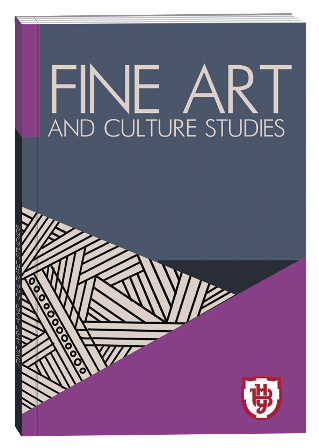“SPOILER EFFECT” IN THE CONTEXT OF THE SPECIFICITY OF THE DEVELOPMENT OF MODERN SCREEN CULTURE
DOI:
https://doi.org/10.32782/facs-2024-4-26Keywords:
spoiler,Abstract
The purpose of the article is to reveal the peculiarities of the "spoiler effect" in the context of the specifics of the development of screen culture in the first decades of the 21st century. Methodology. An analytical method, a method of terminological analysis, was applied, which contributed to clarifying the concept of "spoiler"; a systematic and typological method, thanks to which the spoiler is considered as a phenomenon of modern screen culture with its inherent originality; the method of comparative analysis, the method of generalization, etc. Scientific novelty. The spoiler as a phenomenon of modern screen culture is studied; the effect of a spoiler on a potential consumer of a large-screen format (movie, TV movie, TV series) is conceptualized through the prism of the issue of decreasing/increasing interest in the highlighted narrative (the so-called "spoiler effect"); various formats of spoilers presented in the screen culture of the first decades of the 21st century are considered, in particular, the spoiler as a small screen form; little-known materials related to the development of modern screen culture were introduced into scientific circulation. Conclusions. The study revealed that the "spoiler effect" is a characteristic phenomenon for the modern digital society, which is due to its inherent attitude to information and its perception. Actually, the very appearance of the spoiler is evidence of the approbation of innovative forms of interaction with the viewer, which was formed in modern mass screen culture. Based on previous studies, the key features of spoilers in screen culture can be determined: appearance before the official release of the screen work; the presence of several formats of spoilers (spoilers in the title of a film or television work; spoilers in text communication between users of social networks; spoilers as a small screen form); the ambiguity of determining which information about the screen work is a spoiler (depends on the audience's perception); ambiguity of perception by the potential recipient (may cause a number of positive and negative reactions of the viewer). The influence of the spoiler as a small screen form and potential recipient depends on its type, the corresponding genre, the nature and placement of the spoiler, as well as the individual personality traits of the recipients (including the need for knowledge, etc.).
References
Ворожейкін Є. П. Візуальні стратегії сучасної екранної культури : філософсько-антропологічний аспект : автореф. дис. ... канд. філос. наук : 09.00.04. Нац. пед. ун-т ім. М. П. Драгоманова. Київ, 2018. 19 с.
Желєзняк С. В. Трансформації сучасної аудіовізуальної культури в контексті наукових гуманітарних концепцій. Питання культурології. 2021. Вип. 38. С. 76–84.
Колодко А. Функції екранної культури та вплив на суспільну свідомість інформаційної продукції на українському телебаченні в період незалежності. Народознавчі зошити. 2016. № 2 (128). С. 466–472.
Найдьонов О. Екранна культура мережевого суспільства: виникнення, зміст, цінності, смисли. Вісник Львівського університету. Серія філософсько-політологічні студії. 2019. Вип. 23. С. 66–73.
Станіславська К. І. Мистецько-видовищні форми сучасної культури / вид. друге, перероб. і доп. Київ : Національна академія керівних кадрів культури і мистецтв, 2016. 352 с.
Сучков Д. Г. Трансформація аудіовізуальної культури в епоху соціальних медіа : дис. доктора філософії за спеціальністю 034 Культурологія / Київський національний університет культури і мистецтв. Київ, 2014. 200 с.
Чміль Г. П. Антропологічні засади екранної культури : дис... д-ра філос. наук: 09.00.04. Харківський національний педагогічний ун-т ім. Г.С.Сковороди. Київ, 2005. 422 с.
Brechman J. M., Purvis S.C. Narrative, transportation and advertising. International Journal of Advertising. 2015. Vol. 34, No. 2. рр. 366–382.
Carlson M. Tapping into TiVo: Digital video recorders and the transition from schedules to surveillance in television. New Media and Society. 2006. Issue 8(1). рр. 97–115.
Eliashberg J., Hui S. K., Zhang Z. J. From story line to box office: A new approach for green-lighting movie scripts. Management Science. 2007. Vol. 53(6). рр. 881–893.
Ellithorpe M. E., Brookes S. E. I didn’t see that coming: Spoilers, fan theories, and their influence on enjoyment and parasocial breakup distress during a series finale. Psychology of Popular Media Culture. 2018. Vol. 7(3). рр. 250–263.
Hassoun D. Sequential outliers: The role of spoilers in comic book reading. Journal of Graphic Novels & Comics. 2013. No. 4. рр. 346–358.
Hills M. Psychoanalysis and digital fandom: Theorizing spoilers and fans’ self-narratives. In R. A. Lind (Ed.), Producing theory in a digital world: The intersection of audiences and production in contemporary theory (pp. 105–122). New York, NY: Peter Lang, 2012.
Gray J. Show Sold Separately: Promos, Spoilers, and Other Media Paratexts. New York: New York University Press, 2010. 264 р.
Jeon S., Kim S., Yu H. Spoiler detection in TV program tweets. Information Sciences. 2016. Vol. 329. рр. 220–235.
Johnson B. K., Rosenbaum J. E. Spoiler alert: Consequences of narrative spoilers for dimensions of enjoyment, appreciation, and transportation. Communication Research. 2015. Vol. 42(8). рр. 1068–1088.
Johnson B. K., Udvard E., Eden A., Rosenbaum J. E. Spoilers go bump in the night: Impacts of minor and major reveals on horror film enjoyment. Journal of Media Psychology. 2020 Vol. 32(1). рр. 1–12.
Leavitt, J. D., & Christenfeld, N. J. S. (2013). The fluency of spoilers: Why giving away endings improves stories. Scientific Study of Literature, 3(1), 93–104.
Li Y., Luo X., Li K., Xu X. Exploring the spoiler effect in the digital age: Evidence from the movie industry. Decision Support Systems. 2022. Vol. 157. URL : https://www.sciencedirect.com/science/article/abs/pii/S0167923622000264 (дата звернення : 17.08.2024).
Perks L., McElrath-Hart N. Spoiler definitions and behaviors in the post-network era. Convergence. 2018. Vol. 24(2). рр. 137–151.
Tsang A. S. L., Yan D. Reducing the Spoiler Effect in Experiential Consumption. In A. L. McGill, & S. Shavitt (Eds.). Association for Consumer Research North American Conference Proceedings. 2009. Vol. 36. pp. 708–709.







